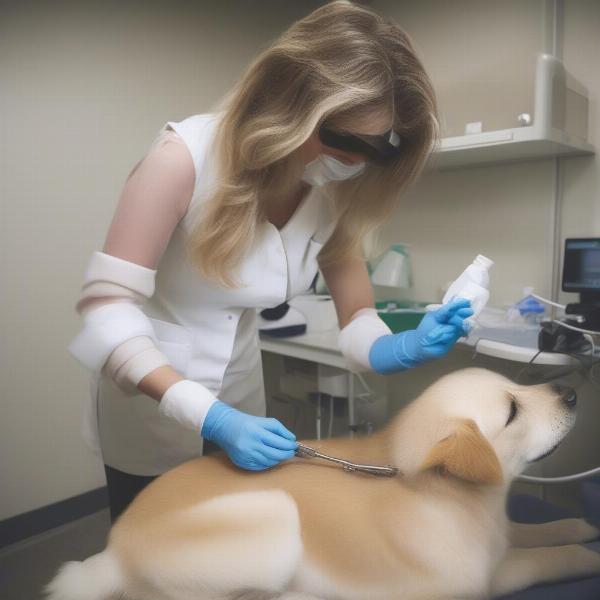Taking care of your dog’s oral health is about more than just fresh breath. It’s a crucial part of their overall well-being. Healthy advantage oral care for dogs can prevent serious health issues down the road and contribute to a happier, healthier life for your furry friend. This article will cover everything you need to know about keeping your dog’s teeth and gums in top shape, from daily brushing to professional cleanings.
Why is Healthy Advantage Oral Care Important for Dogs?
Just like humans, dogs can develop plaque and tartar buildup, leading to gingivitis, periodontal disease, and even tooth loss. Poor oral hygiene can also affect other organs, such as the heart, liver, and kidneys, as bacteria from the mouth can enter the bloodstream. Healthy advantage oral care for dogs isn’t just about aesthetics; it’s about preventing pain, discomfort, and potentially life-threatening conditions.
Signs of Dental Problems in Dogs
How can you tell if your dog is experiencing dental discomfort? Look out for these common signs:
- Bad breath
- Red, swollen gums
- Excessive drooling
- Difficulty chewing
- Pawing at the mouth
- Loss of appetite
Practical Tips for Healthy Advantage Oral Care
Implementing a regular oral care routine is the best way to ensure healthy advantage oral care for dogs. Here are some practical tips to get you started:
Brushing Your Dog’s Teeth
Brushing your dog’s teeth is the cornerstone of good oral hygiene. Start slowly, using a dog-specific toothbrush and toothpaste. Never use human toothpaste, as it contains ingredients that can be harmful to dogs.
Dental Chews and Treats
Dental chews and treats can help scrape away plaque and tartar. Look for products that are Veterinary Oral Health Council (VOHC) approved.
Dental Diets
Some dog foods are specifically formulated to promote dental health. These diets often have a kibble texture that helps clean the teeth as the dog chews.
Professional Dental Cleanings
Even with regular home care, professional dental cleanings are essential for healthy advantage oral care for dogs. Your veterinarian can perform a thorough cleaning under anesthesia, removing plaque and tartar buildup below the gum line.
How Often Should My Dog Have a Professional Cleaning?
The frequency of professional cleanings depends on your dog’s breed, age, and overall oral health. Your veterinarian can recommend a schedule that’s right for your dog.
Healthy Advantage Oral Care for Puppies and Senior Dogs
Puppies and senior dogs have unique oral care needs. Start brushing your puppy’s teeth as early as possible to get them used to the process. Senior dogs may require more frequent professional cleanings and specialized care.
 Veterinarian examining dog's teeth
Veterinarian examining dog's teeth
Conclusion
Healthy advantage oral care for dogs is a vital part of their overall health and well-being. By following these tips and working closely with your veterinarian, you can help your furry friend enjoy a healthy, happy smile for years to come. Don’t wait until your dog shows signs of dental problems; start practicing preventative care today.
FAQ
- How can I get my dog used to having their teeth brushed? Start slowly and use positive reinforcement, such as treats and praise.
- Are there any home remedies for dog bad breath? While some home remedies may temporarily mask bad breath, they won’t address the underlying cause. Consult your veterinarian for proper diagnosis and treatment.
- What should I look for in a dog dental chew? Choose chews that are VOHC-approved and appropriate for your dog’s size and chewing habits.
- How much does a professional dog dental cleaning cost? The cost varies depending on your location and the complexity of the procedure. Consult your veterinarian for an estimate.
- Can I use human toothpaste on my dog? No, human toothpaste contains ingredients that can be harmful to dogs. Always use dog-specific toothpaste.
- What are the long-term effects of poor oral hygiene in dogs? Poor oral hygiene can lead to periodontal disease, tooth loss, and even systemic health issues affecting the heart, liver, and kidneys.
- How often should I brush my dog’s teeth? Ideally, you should brush your dog’s teeth daily.
Related Articles
ILM Dog is a leading international pet website dedicated to providing expert advice on dog care and wellbeing. We cover everything from breed selection and training to nutrition, grooming, and health. Whether you’re a new dog owner or a seasoned expert, ILM Dog has the resources you need to ensure your canine companion lives a long, healthy, and fulfilling life. Contact us today for all your dog-related queries! Email: [email protected], Phone: +44 20-3965-8624.